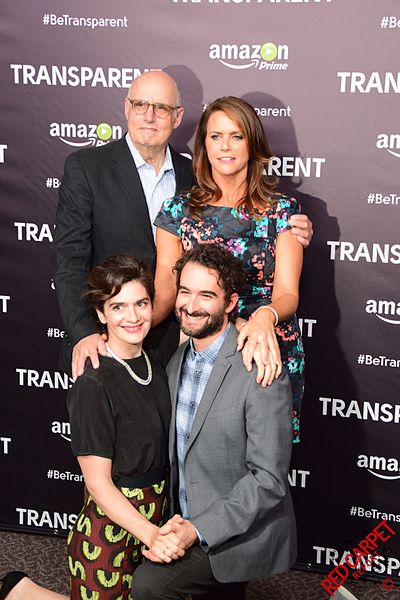
News
Pro-Palestine Encampment Represents First Major Test for Harvard President Alan Garber

News
Israeli PM Benjamin Netanyahu Condemns Antisemitism at U.S. Colleges Amid Encampment at Harvard

News
‘A Joke’: Nikole Hannah-Jones Says Harvard Should Spend More on Legacy of Slavery Initiative

News
Massachusetts ACLU Demands Harvard Reinstate PSC in Letter

News
LIVE UPDATES: Pro-Palestine Protesters Begin Encampment in Harvard Yard
Crossing Boundaries, Tackling Borders, and Challenging the Past: Season Four of ‘Transparent’ Does It All
Season Review

After three seasons of Pfefferman farce, fans of Jill Soloway’s critically acclaimed Amazon original, “Transparent,” are well aware of the family’s nonsensical, albeit addicting, histrionics. “Transparent” has never been the type of show to shy away from the uncomfortable, and Season Four of the series is no different, once again drawing viewers in with its raw portrayals of familial, religious, and for the first time, international dissonance. Set to the beat of “Everything’s Alright” from “Jesus Christ Superstar,” Season Four brilliantly builds off of the ideas of identity and inherited trauma that drove the show’s previous seasons, while opening up space to explore yet another recurring and related theme in the Pfefferman’s lives: the role of physical and metaphysical borders.
For a show that prides itself on its unabashedly political portrayal of the postmodern American-Jewish experience, a trip to Israel—the driving force behind Season Four—seems like an inevitable, yet perhaps cliché move for the Pfefferman clan. Rest assured, however, the portrait of the comically dysfunctional family in the Holy Land is anything but banal. Soloway (who uses singular they pronouns) truly outdoes themselves in Season Four, propelling the plot forward through a combination of impressive cinematography and stunning screenplay that work together to reveal its characters’ deeper truths. This season is remarkable by all accounts, but what separates it from its predecessors is the ease with which dialogue flows between characters. Sheathed in humor and delivered via suckerpunch, the Pfeffermans’ yiddishe banter hits harder than it ever has before, shedding light not only on each of our characters’ individuality, but also on the often ironic realities that govern our lives (and theirs, of course).
“The problem with the two-state solution,” Shelly (Judith Light), our beloved Pfefferman matriarch, says at one point in the crossfire of family repartee, “is that it sounds too much like the Final Solution,” offering a subtle, yet poignant jab at a decades-long conflict rooted in a religious and identity-driven binary. This, however, is merely one of the many sharp lines Shelly doles out. After three seasons of slow character development, we finally begin to see Shelly as more than just the nagging mother figure. She’s fiery, brave, and—like the rest of the Pfeffermans—her inability to come to terms with her past has left her incapable of staying within an appropriate proximity to the people around her. When her son, Josh (Jay Duplass), calls her a “boundary pusher” after she flagrantly cuts ties with her condominium complex and moves in with him, she cries back that she truly has “no idea what boundaries are!”
Shelly and Josh are not the only Pfeffermans dealing with the repercussions of vaguely-outlined boundaries. After finding out that Leslie (Cherry Jones), her ex-lover and accused-sex-offender, has published a poem in the “New Yorker” about her vagina, Ali decides to accompany Maura (Jeffrey Tambor), who is set to deliver a keynote on Judaism and gender, to Israel. There, she becomes swept away by new love-interest Lyfe (Folake Olowofoyeku) and company who “only eat Bamba when they’re drunk” as to not support the Israeli occupation of the West Bank. Between her exploration into her own gender fluidity and the subsequent assault on her identity by her ex-girlfriend, her questioning of the ethics and politics of the Jewish state, and the quite-literal occupation of her L.A. apartment by a family of bizarre Airbnb-ers, Ali appears to be stuck at a traverse of all sorts of boundaries and binaries.
What began as a quick two-week journey to the Holy Land quickly becomes a Pfefferman family affair, and although Ali leaves her family’s quasi-birthright trip in favor of a more enriching experience on her friend’s farm in Ramallah, the remaining Pfefferman children and their parents continue to wander the country, arousing and examining interfamilial and international discord. We are reminded by Josh’s ex-weed dealer that “boundaries are how people tell other people what they need,” but until the Pfeffermans can figure out exactly what it is they need, the boundaries they try to establish with each other and the world around them are destined to remain foggy. It’s impossible to predict what this process of self-reflection will look like, but if it’s anything like their journey this season, it’s en route to be one marked by the humor of a beautifully captured and purely human spirit.

For more Arts Blog coverage, click here.
Want to keep up with breaking news? Subscribe to our email newsletter.
